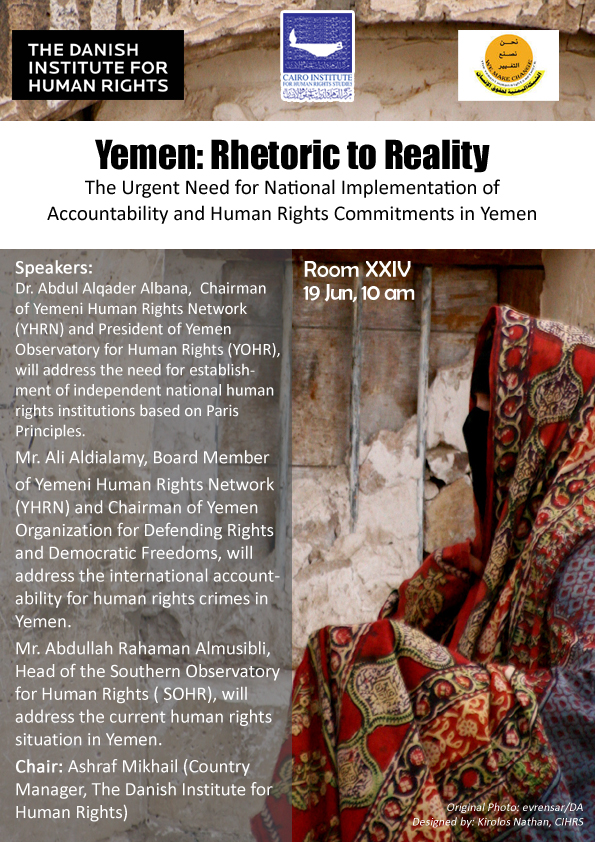 The Cairo Institute for Human Rights Studies (CIHRS) and the Yemeni Network for Human Rights (YNHR) are concerned about the seriousness of Yemen’s intent to implement the recommendations of the Universal Periodic Review (UPR), accepted by the Yemeni government last January during the review of Yemen’s human rights record. The two organizations said that Yemen must take serious steps that reflect its desire to comply with the UPR recommendations and implement them on the ground; they also stressed the importance of forming an international, independent fact-finding commission to investigate the crimes and abuses perpetrated in Yemen, in order to ensure accountability.
The Cairo Institute for Human Rights Studies (CIHRS) and the Yemeni Network for Human Rights (YNHR) are concerned about the seriousness of Yemen’s intent to implement the recommendations of the Universal Periodic Review (UPR), accepted by the Yemeni government last January during the review of Yemen’s human rights record. The two organizations said that Yemen must take serious steps that reflect its desire to comply with the UPR recommendations and implement them on the ground; they also stressed the importance of forming an international, independent fact-finding commission to investigate the crimes and abuses perpetrated in Yemen, in order to ensure accountability.
Over the last five months, Yemen has taken no steps demonstrating its intention to implement any of the 166 recommendations it accepted in January’s session, although the rights and international community welcomed this commitment and urged the Yemeni government to incorporate these recommendations into its national human rights plan, scheduled for completion before the end of 2014.
In the session for the adoption of Yemen’s UPR recommendations, held on Thursday, June 19, 2014 in Geneva as part of the UN Human Rights Council 26th session, only Yemen’s UN representative was in attendance, with no other showing from the Yemeni Ministry of Human Rights or other relevant ministries. The UN representative said that given the deterioration of the situation in Yemen over the last five months, Yemen was unable to review the remaining 25 UN recommendations to improve human rights in the country, though he reiterated Yemen’s commitment to the recommendations it had already adopted in the UPR in January.
It is worth noting that Yemen accepted 125 of 142 recommendations made during its first UPR in September 2009, but most of them were never implemented.
Yesterday, CIHRS and YNHR presented an oral intervention to the HRC, expressing their concern with what appears to be the Yemeni government’s only theoretical commitment to UN recommendations, with no actual demonstration on the ground and no serious steps taken to suggest it intends to implement these recommendations. The two organizations urged the Yemeni government to incorporate all the recommendations it had accepted into a time-bound, specific plan, in the framework of its national human rights strategy scheduled to appear before the year is out. They also stressed the need to continue efforts to establish a national human rights institution that operates independently in accordance with the Paris Principles and to guarantee the selection of members on the basis of merit and qualifications, in consultation with civil society, instead of based on the usual partisan divisions.
In the same context, CIHRS and YNHR also called for an end to attacks on journalists and the media and all repression of freedom of expression and peaceful activities, as well as political arrests, especially in southern Yemen. The two organizations urged the drafting of specific constitutional protections for human rights, as well as genuine guarantees for the implementation of the outcome of the national dialogue related to human rights. The state must also fulfill its obligations to end armed conflict and war casualties, combat terrorism in light of international principles, and stop all manner of collective punishment against areas in which unarmed civilians are present.
In a side event in Geneva on June 19, organized by CIHRS in conjunction with YNHR and the Danish Institute for Human Rights and titled, “YEMEN: Rhetoric To Reality,” participants stressed that Yemen should take serious measures that reflect its commitment to the UPR recommendations. These measures must include independent investigations into the violations of 2011. The government has long been unwilling or unable to bring to account those responsible for killing thousands of peaceful demonstrators. Speakers at the side event urged the international community to bring justice to the victims through the creation of an international fact-finding commission, which will investigate violations in Yemen.
Share this Post

